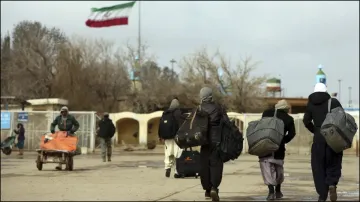Quetta: In a development that threatens the relationship between Pakistan and Iran, Iranian border guards opened fire at a vehicle carrying a group of Pakistanis along the border in the Washuk district of Balochistan province, resulting in four deaths and two others being injured, according to officials. Government administrator Sahibzada Asfand said it was unclear why the Iranian forces opened fire.
Local police said the incident happened near the border village of Mashkel in Baluchistan province on Wednesday. The bodies of the four men killed by Iranian fire in Balochistan have been handed over to their families. There was no immediate response either from the Iranian government nor Pakistan's Foreign Ministry.
“Iranian forces opened fire inside Pakistani border,” a senior official of the Mashkel administration said, adding that the victims were sitting in the Pakistani border area when the Iranian forces opened fire, according to Dawn. An official posted at the border said the Pakistani nationals killed or injured were involved in the supply of Iranian smuggled oil.
However, one of the injured claimed that they were waiting for an oil consignment when the Iranian forces opened fire, resulting in the deaths of eight people, including four Iranians who were taken away by Iranian forces. This is yet to be confirmed by Iranian officials. Security forces on both sides often arrest smugglers and insurgents who operate in the region.
Iran-Pakistan tensions
In January, Pakistan in tit-for-tat strikes in January targeted alleged militant hideouts inside Iran, killing at least nine people in retaliation for a similar attack by Iran. Pakistan carried out preceision strikes against separatist militants in Iran using killer drones, rockets, loitering munitions and stand-off weapons that struck "terrorist" groups Balochistan Liberation Army and the Balochistan Liberation Front, killing nine people. This came two days after Tehran said it struck the bases of a terrorist group in Pakistan's Balochistan province on Tuesday, following which Islamabad recalled its envoy and expelled the Iranian Ambassador.
However, the two countries agreed to tone down tensions in the spirit of 'mutual trust and cooperation' after tit-for-tat missile attacks against each other, with Islamabad reiterating that they had no desire to escalate tensions. Iran's late foreign minister Hossein Amir-Abdollahian later visited Islamabad and both nations agreed to resume the duties of their respective ambassadors.
Pakistan also hosted a three-day visit by late Iranian President Ebrahim Raisi, who committed to increase their annual bilateral trade volume to $10 billion over the next five years, calling it the “best opportunity” to cement ties across different fields. The visiting president also asserted that exchanging “potentials and capabilities” that exist in both countries would serve the interests of the two nations. Raisi died in a helicopter crash earlier this month.
(with AP inputs)
ALSO READ | Pakistan: Suspected militants burn girls' school in Khyber Pakhtunkhwa, third such attack this month
Latest World News
